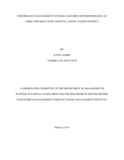| dc.description.abstract | PERFORMANCE MANAGEMENT SYSTEMS AND EMPLOYEE PERFORMANCE AT
CoRSU REHABILITATION HOSPITAL, KISUBI-WAKISO DISTRICT
By Lydia Nambi
Background
Employee performance is important to every organization as it is the backbone of an
organization’s status and can affect productivity. For organizations to know how their employees
are performing, there is need for collection of performance information. This study sought out to
examine performance management systems and employee performance at CoRSU Rehabilitation
Hospital, Kisubi, Wakiso district.
Objectives
1. To investigate how performance planning influences employee performance at CoRSU
Rehabilitation Hospital, Kisubi, Wakiso district.
2. To examine the relationship between performance monitoring and employee performance
at CoRSU Rehabilitation Hospital, Kisubi, Wakiso district
3. To find out how performance evaluations influence employee performance at CoRSU
Rehabilitation Hospital, Kisubi, Wakiso district.
Methods
A Cross-sectional survey design was used. The design permitted use of both qualitative and
quantitative data collection and analysis methods. 10 participants were interviewed for
qualitative data collection using key informant interviews as data collection methods with the
help of interview guides as a tool for data collection. Questionnaire surveys as quantitative data
xi
collection method were administered to 74 respondents using self-administered questionnaires as
a tool to collect quantitative data. Qualitative data collected was analyzed using thematic
analysis. For Quantitative analysis, Factor analysis for data deduction, Pearson’s correlation
coefficient technique was applied to generate coefficients, which were helpful to show the
relationships between variables. Linear regression analysis was applied to show the magnitude of
influence of the dependent variables on the dependent variable.
Results
This study revealed that two factors of performance management systems namely; performance
monitoring and performance evaluation influenced employee performance at CoRSU
Rehabilitation Hospital. However, it was discovered that performance planning had negligible
influence on employee performance at the hospital and was statistically not significant.
Generally, this study found that performance management systems under study explained a
49.2% variation in employee performance at CoRSU.
Additionally, the key indicators which factored highly indicating the measurement of employee
performance at CoRSU Rehabilitation Hospital were; timely achievement of targets; quality care
and services; and high employee commitment.
Conclusions
This study has shown that performance planning is very critical to changes in employee
performance unfortunately, CoRSU Rehabilitation Hospital was found not to highly prioritize it
in its performance management systems. Regarding performance monitoring, it was found to be
moderately correlated to employee performance. It was discovered that performance evaluation
was the strongest factor associated with employee performance at the hospital. | en_US |

